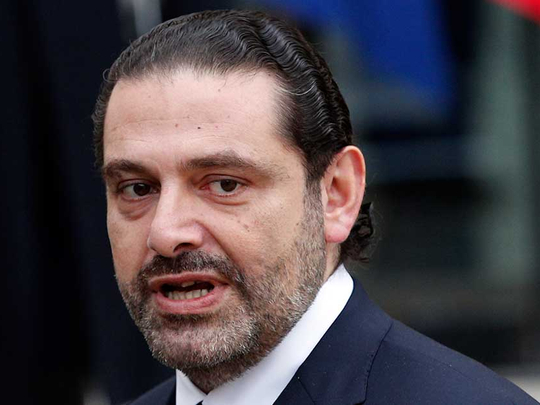
Beirut: Lebanese Prime Minister Sa’ad Hariri, whose resignation from Saudi Arabia earlier this month caused widespread consternation, is set to return to Beirut this week as part of a deal brokered by France.
But will his resignation stand, forcing negotiations on a new government, or might he withdraw the decision? Here are some of the possible scenarios in the coming days.
Under Lebanon’s constitution, the president is bound to accept a prime minister’s resignation however it is tendered, Lebanese constitutional expert Edmond Rizk told AFP.
“The Lebanese constitution doesn’t talk about the nature of a resignation. It just stipulates that if the head of government resigns, then the government has resigned,” Rizk said.
Such a decision automatically brings down the government, and the president then engages in consultations to select a new prime minister to form a cabinet.
Although it is not outlined in the constitution, Rizk said, custom dictates that “this resignation is supposed to be submitted to the president of the republic.”
Hariri announced he was stepping down in a television broadcast from Riyadh on November 4, but Lebanese President Michel Aoun has insisted he will not officially accept it before Hariri presents his decision in person.
In Paris, Hariri acknowledged he would see Aoun once back in Beirut to discuss his decision.
“As you know I have resigned, and we will discuss that in Lebanon,” he told reporters.
If Hariri’s resignation stands, consultations will need to begin on who will form a new government, just under a year after the last one was agreed.
In the interim, the resigned prime minister and cabinet continue functioning in a “caretaker” role until a new government is announced.
Forming a government in Lebanon usually takes months of wrangling among the country’s deeply divided political factions.
The smoothest scenario would see Aoun name Hariri as prime minister again, with widespread backing from Lebanon’s political class, as part of a similar deal to the 2016 settlement.
If Hariri is unwilling, or unable, to form a government, Aoun could then name a different prime minister.
Under a power-sharing agreement, Lebanon’s top political posts are distributed among the country’s religious sects, with the prime minister’s office reserved for a Sunni Muslim.
There are several candidates within the Sunni community, but it is unclear whether any of them would be better able to negotiate a deal to produce a new government.
A final scenario, and perhaps the least destabilising for the country, would be for Hariri to withdraw his resignation.
Hariri has left the door open to this possibility, saying in his only interview since stepping down that he would be willing to “rescind the resignation” if Hezbollah withdrew from regional conflicts.
He accuses the powerful Shiite group of violating Lebanon’s so-called “disassociation policy” intended to keep the country out of conflicts like that in neighbouring Syria.
Hezbollah is actively fighting on the side of President Bashar Al Assad in the six-year war, and also stands accused of supporting Al houthi militia against Saudi Arabia in Yemen.
“We need to respect the disassociation policy,” Hariri said in the interview.












